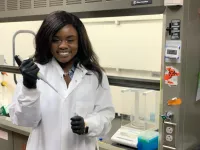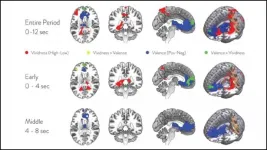(Press-News.org) Viruses attack the body by sending their genetic code -- DNA and RNA -- into cells and multiplying. A promising class of therapeutics that uses synthetic nucleic acids to target and shut down specific, harmful genes and prevent viruses from spreading is gaining steam.
However, only a handful of siRNA, or other RNA interference-based therapeutics have been approved. One of the main problems is getting the siRNA into the body and guiding it to the target.
Chemical engineering researchers in the Cockrell School of Engineering aim to solve that problem, while improving the targeting effectiveness of siRNA. In a new paper in the Journal of Controlled Release, the researchers created several different types of nanoparticles and analyzed them for the ability to deliver and protect siRNA from the body's immune system.
"The human body is such a diverse place with so many systems to protect us from foreign materials," said Aaliyah Shodeinde, a fourth-year graduate researcher in the McKetta Department of Chemical Engineering working in professor and drug delivery pioneer Nicholas Peppas' lab. "So, whenever you try to introduce a synthetically derived material, it almost immediately activates the immune system's defenses, so you need some kind of protection for the siRNA."
Several different types of nanoparticles created in Peppas' lab proved effective at siRNA delivery. The research team measured how well the particles can take in stimuli from their environment, such as changing levels of pH, and adjust accordingly without breaking down.
The team sought to find the right balance between protection and effectiveness of the siRNAs in silencing harmful genes while also minimizing the toxicity of the particles.
"Researchers need to keep in mind that a perfect system may not be feasible at this time because of the need to find a balance with so many moving parts," Shodeinde said. "What we've been able to achieve successfully is modulating so many different parameters to find that sweet spot."
siRNA is so exciting to researchers because it can be fine-tuned to hinder many different kinds of genes in the body. They then specifically target the mRNA -- short for messenger RNA -- that tell cells what to do. mRNA has become a part of the popular lexicon lately because several of the COVID-19 vaccines use mRNA to tell cells to produce antibodies to fight off the coronavirus spike proteins.
Shodeinde notes that symptoms in many diseases come from the over- or under-production of proteins. siRNA can be configured to find genes enabling this irregular protein production and, more or less, shut them down. This "upstream" solution is something that traditional therapies can't achieve, Shodeinde said.
"siRNAs come in before the protein expression level, so we're hoping that using them to alter the gene expression levels can give us better results," she said.
This work builds on several previous papers that have come out of Peppas' lab focused on developing hydrogels and nanoparticles for drug delivery. Just last week Peppas, Shodeinde and Deidra Ward, a chemical engineering Ph.D. student, published a new paper about this in Advanced Healthcare Materials. In it, the authors discuss their vision for the future of RNA-based therapeutics in the treatment of certain types of cancers.
"The results of this new research from our laboratories are promising and add on to our previous research on siRNA delivery that commenced about 10 years ago and has led to about 15 refereed publications and two issued U.S. patents," said Peppas, the principal investigator of the siRNA paper.
Up next, the researchers want to improve cell targeting. It is key, Shodeinde said, to making sure the siRNAs only interact with target cells and don't shut down anything they're not supposed to.
INFORMATION:
The research was funded through grants from the National Institutes of Health. Peppas, who is a professor in the Cockrell School's McKetta Department of Chemical Engineering and Department of Biomedical Engineering and holds appointments in UT's College of Pharmacy and the Dell Medical School, is the corresponding author. Other authors include Hannah Hodges, an incoming medical student at UT Southwestern and 2021 graduate of the McKetta Department of Chemical Engineering, as well as David W. Beckman and Bryan Luu, also graduates of the McKetta Department of Chemical Engineering who are now students in medical school.
May 17, 2021 - Amid the rising toll of opioid overdoses and deaths in the U.S., several states are considering laws enabling civil commitment for involuntary treatment of patients with substance use disorders (SUDs). Most addiction medicine physicians support civil commitment for SUD treatment - but others strongly oppose this approach, reports a survey study in Journal of Addiction Medicine, the official journal of the American Society of Addiction Medicine (ASAM). The journal is published in the Lippincott portfolio by Wolters Kluwer.
"Civil commitment has emerged as a sometimes compelling yet controversial policy option," according to the new study, led by Abhishek Jain, MD. At the time of ...
Some 16 million Americans are believed to have alcohol use disorder, and an estimated 93,000 people in the U.S. die from alcohol-related causes each year. Both of those numbers are expected to grow as a result of heavier drinking during the COVID-19 pandemic.
Yet, in a new study involving data from more than 200,000 people with and without alcohol problems, researchers at Washington University School of Medicine in St. Louis found that although the vast majority of those with alcohol use disorder see their doctors regularly for a range of issues, fewer than one in 10 ever get treatment for drinking.
The findings are published in the June issue of the journal Alcoholism: Clinical & Experimental Research.
Analyzing data gathered from 2015 through 2019 via the National ...
In a world that's changing fast, the Long Term Ecological Research (LTER) Network can seem almost an anachronism. Yet the patience and persistence that have generated 40 years of careful, reliable science about the Earth's changing ecosystems may prove to be just what's needed in this rapidly shifting world. We can't wait for a crystal ball -- and we don't have to. By harnessing decades of rich data, scientists are beginning to forecast future conditions and plan ways to manage, mitigate, or adapt to likely changes in ecosystems that will impact human economies, health and wellbeing.
The National Science Foundation established the LTER Network more than 40 years ago to provide an alternative to funding models that favored constant innovation over continuity. The model has proven to be extraordinarily ...
An international study has found that four out of five women in prison in Scotland have a history of head injury, mostly sustained through domestic violence. Published recently in The Lancet, researchers, including SFU psychology graduate student Hira Aslam, say the study has important implications for the female prison population more broadly and could help to inform mental health and criminal justice policy development.
"The findings are incredibly sobering," says Aslam. "While we anticipated that the incidence of head injuries among women who are involved in the criminal justice system would be high, these estimates exceeded our expectations."
Researchers also found that violent criminal behaviour was three times more likely among women who had a history of significant head injury, ...
ATS 2021, New York, NY - Air quality standards recommended by the American Thoracic Society (ATS) have the potential to prevent more illness and death than standards adopted by the U.S. Environmental Protection Agency (EPA), according to research presented at the ATS 2021 International Conference.
Laura Gladson, MS, a research scholar with the Air Quality Program at the Marron Institute of Urban Management, New York University (NYU) and colleagues from NYU and the ATS assessed differences between the potential public health protections provided by EPA air quality standards and the more stringent standards proposed by the ATS. Comparing real-world ...
Two components of imagination -- constructing and evaluating imagined scenarios -- rely on separate subnetworks in the default mode network, according to research recently published in JNeurosci.
Even when you aren't doing anything, your brain is hard at work. The default mode network (DMN) activates during the brain's resting state and has been linked to daydreaming, planning, and imagining the future. In previous studies, scientists noticed the DMN could be divided into two subnetworks, ventral and dorsal, but their different roles were debated.
Lee et al. used fMRI to measure participants' brain activity while they imagined scenarios listed on prompts, like "Imagine you win the lottery." The scenarios ...
KINGSTON, R.I. - May 17, 2021 - An article recently published in the prestigious journal Nature Communications, written by University of Rhode Island END ...
Clinicians and surgeons are increasingly using medical devices based on artificial intelligence. These AI devices, which rely on data-driven algorithms to inform health care decisions, presently aid in diagnosing cancers, heart conditions and diseases of the eye, with many more applications on the way.
Given this surge in AI, two Stanford University faculty members are calling for efforts to ensure that this technology does not exacerbate existing heath care disparities.
In a new perspective paper, Stanford faculty discuss sex, gender and race bias in medicine and how these biases could be perpetuated by AI devices. The authors suggest several short- and long-term approaches to prevent AI-related ...
BOSTON - Peripheral artery disease (PAD), or blockages in the arteries outside of the heart, affects more than 200 million people worldwide and 12.5 million people in the United States. Patients with this circulatory disorder may develop severe leg pain or unhealing wounds that require a minimally invasive revascularization procedure to open the blood vessels to improve blood flow.
For nearly a decade, proceduralists and surgeons have depended on devices coated with a drug called paclitaxel -- which reduces the need for another procedure by up to 50 percent -- during procedures to open the arteries of the leg. However, in the wake of a 2018 study that found a potential link between ...
COLUMBUS, Ohio - Up to 38.6% of people with colon cancer who have a hereditary cancer syndrome--including 6.3% of those with Lynch syndrome--could have their conditions remain undetected with current universal tumor-screening methods, and at least 7.1% of people with colorectal cancer have an identifiable inherited genetic mutation, according to new data published by scientists at The Ohio State University Comprehensive Cancer Center - Arthur G. James Cancer Hospital and Richard J. Solove Research Institute (OSUCCC - James).
Experts say their data, which was gathered from a cohort of more than 3,300 colorectal cancer patients treated at 51 hospitals across Ohio, makes a strong scientific argument for implementing multi-gene panel ...



